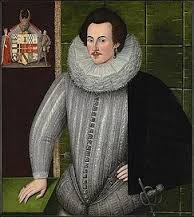Penelope Devereux: an Elizabethan Firebrand
Chapter 3 : Politics and Passion
Later in life, Penelope, no longer the ingénue, became enmeshed in political intrigue. Her brother, Essex, had replaced the Earl of Leicester as the aging Queen’s favourite, which meant that the Devereux clan became powerful players at court and the main opposition to the Cecils, a father and son who many believed controlled Elizabeth behind the throne.
But the Devereuxs were also feathering their nests for the future, politically speaking. Elizabeth refused to name an heir, which gave rise to great fear about what might happen in the event of her death – crowns were rarely handed on without bloodshed when there was no clear line of succession. So behind the scenes Penelope was making a secret and treasonous alliance with James VI of Scotland, backing his claim to the English throne in the hope of placing the Devereuxs at the heart of the new regime.

At this time she met and fell in love with Charles Blount, a courtier on the rise, who was later to become Lord Mountjoy and eventually, under James I, Earl of Devonshire. Despite the fact that she was married to Rich, with whom she had four children, she took Blount as a lover. An enigma at the centre of this story is that, for reasons we can only speculate on, Rich was unusually accepting of his cuckold’s horns.
Penelope had at least three children with Blount, who were raised in the Rich nursery for the sake of appearances, but the affair was an open secret in court circles and one to which Elizabeth turned a blind eye. For a queen who notoriously meted out harsh punishments to women who transgressed her strict rules of modesty this was unusual.
Penelope’s behaviour in parenting ‘natural children’ with one other than her spouse, something considered normal in a man of rank, but absolutely unacceptable in a woman, was overlooked by all. I like to see it as testimony to Penelope’s strength of character and her refusal to be limited by the very narrow definition of femininity and expected behaviours for women.
